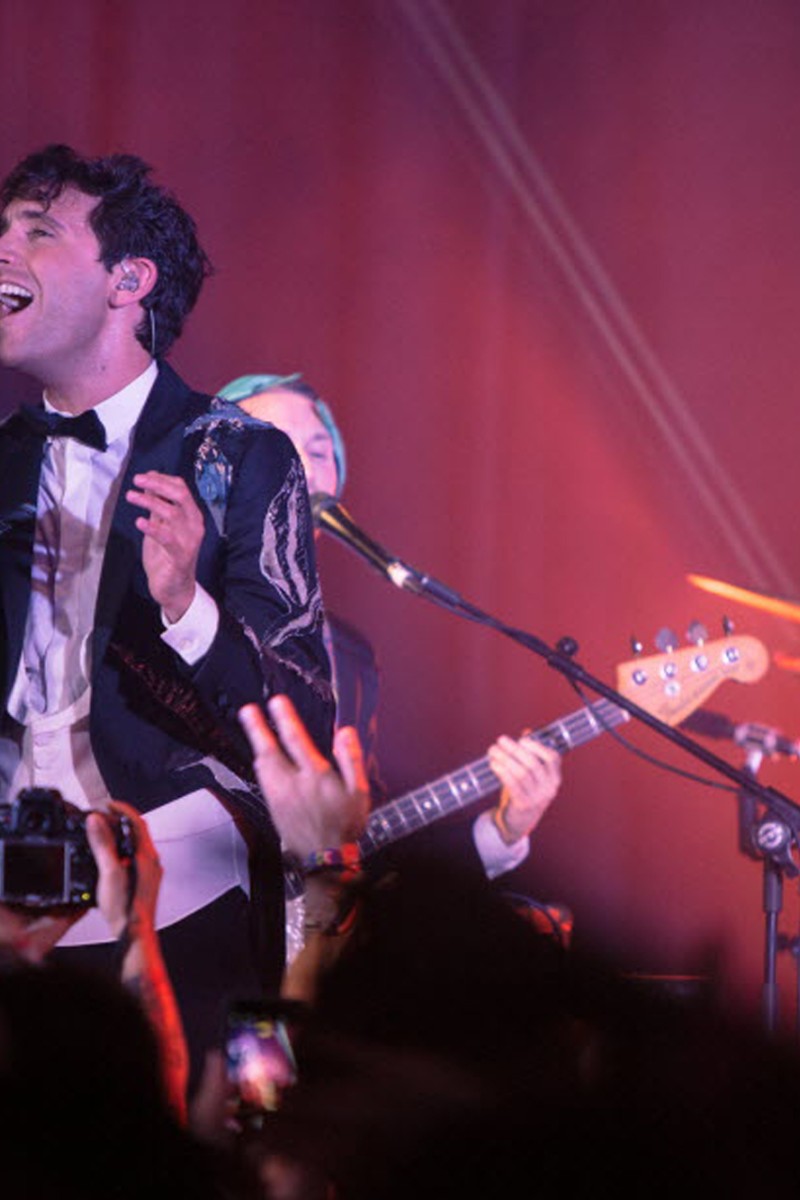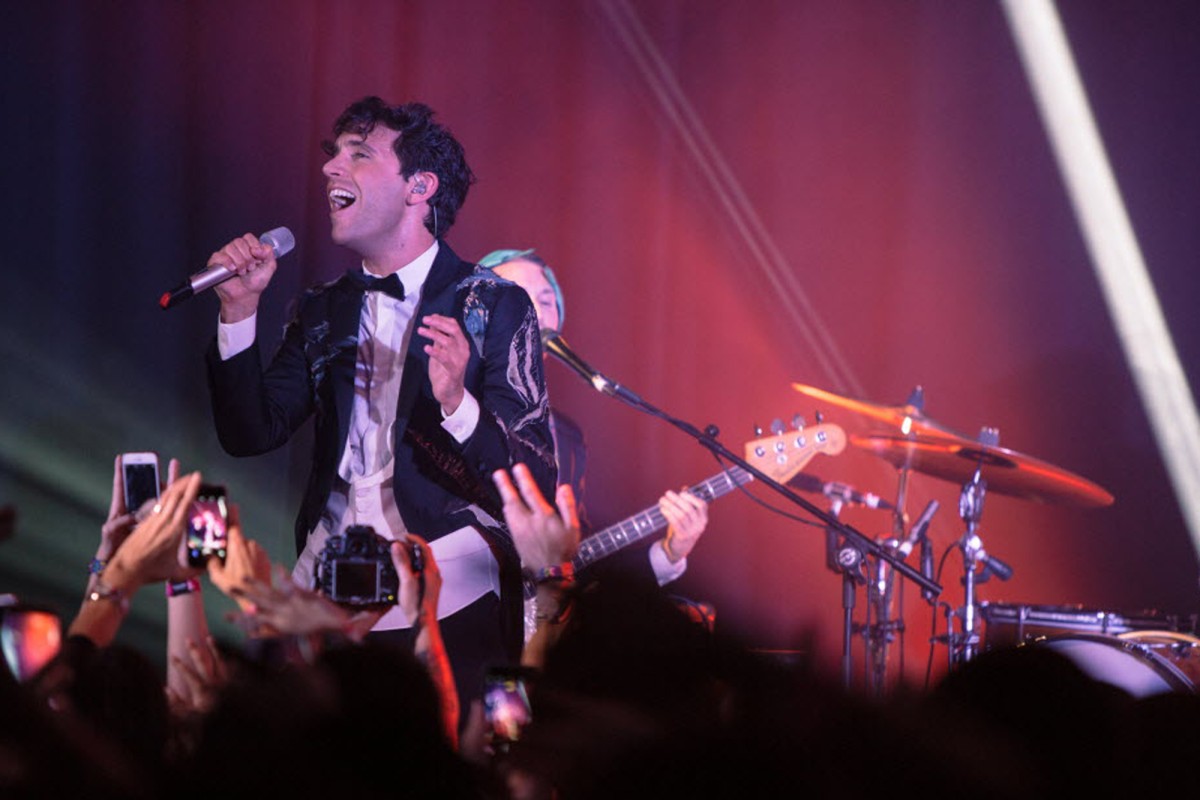
Mika reveals his love for dim sum, why small gigs are important and how his mum reacted to his lyric “all that she wants is another son”
British singer Mika came to Hong Kong and spoke to Young Post about prepping shows, working with his mum and barbecue pork
 While Mika is famous for putting on dynamic, huge arena shows, he says tiny, intimate shows are the ones that keep him sharp.
While Mika is famous for putting on dynamic, huge arena shows, he says tiny, intimate shows are the ones that keep him sharp.As flamboyant as Mika is on stage, backstage the British singer is soft-spoken with a thoughtful demeanour. Now at the age of 32, he’s never seemed more comfortable in his own skin. So why does No Place in Heaven sound so hopeless? “There’s no place in heaven for someone like me, there’s no place in hea ...” he croons in the song. But the lyrics pages might have gotten that last line wrong. Instead of a dragged on first syllable of “heaven”, Mika was singing “hell”. “So if there’s no place in heaven or hell that means I’m free,” Mika tells Young Post. “I’m liberated. The song is in a sense really horrible. It was partly written as a letter to my father that then turns into the father. You deal with the conflict by illustrating the conflict.”
With that settled, we discuss prepping shows, working with his mum, and French music.
How are you finding Hong Kong?
I was cooped up in my hotel room for the first 15 hours here doing all the press, and then afterwards I just walked around. I’ve been here many times. The thing about this place is that you guys have some of the best restaurants in the world. I just spend my time eating.
What’s your favourite thing to eat here?
Dim sum. There’s nothing like it. And barbecue pork. You dream of it when you’re eating that horrible [crappy] dim sum that you eat in London. And it’s so expensive in London.
You never listen back to your own music after you record it. So how do you prepare for a live show?
I designed a new system which is super geeky, but we use a sampling system which has pieces from every single song, from like a timpani sample to a girl’s “oooh” vocals. Which means that I can play any of my songs, from any of my albums, and make it sound like the record even without a set list.
When I’m preparing for a show it’s just about having as much flexibility as possible so that you’re not caught in some kind of sophisticated karaoke routine. I do different things every night. Like here, this is a tiny show. And at a tiny show there’s no point in bringing a set, because it’s all about the connection. If you manage to put a little bit of personal touch in it then that’s more memorable than any spectacular set you can ever have.
How often do you do small shows?
I always put in a couple of small shows even when I’m doing big shows in the same run. The last one I did was probably two months ago. I think it’s really good in tour even though it costs a fortune. It’s expensive to do small shows. But they keep you sharp. It’s like exercise. Keeps your brain ticking. They keep you fresh and you can develop ideas without the pressure of a team of 45 people on top of you waiting for the next cue.
And what’s your process for prepping big shows?
It’s one that I’m going through right now developing a new arena show. It all starts in my kitchen and it’s about, what’s the message? If I had to write the message for a show, can I do it in one sentence? So the last time I did this was about seven months ago and the show was called Heaven. I’m at the gate of heaven and I couldn’t get in. It looks like this kind of Blade Runner landscape.
I presented this to a friend of mine, Job Smeets from Studio Job. They’re mega designers that do museum shows. And I’m like, this is my story, can you help me illustrate it? And between him, a group of fans in a village in Italy who are specialists in street theatre, Valentino Couture house, and Christian Louboutin, we all came together, and built the show. We make models, illustrations, and little videos, and all these elements show in a huge aeroplane hanger, and I sit at a table and put together the show with my team. And we pray to God that it’ll be good.
It doesn’t guarantee you commercial success, but it certainly guarantees you inspiration. It’s all in the process. I’ve been doing this for 10 years now – I’ve given myself the freedom but I’ve also had to pay the price for it as well. But it doesn’t really matter to me because the totality of it tells a story and helps me develop my own way of doing things.
What’s it like working with your mum on costumes?
The funny thing is when we are together no one would even think she’s my mum. We just work together. I’m the kid that ran away with the circus but took his entire family with him. It wasn’t really the idea, but it just happened that way (laughs). I work with her because she’s good. She’s an anti-snob. She doesn’t care if something’s expensive or cheap, as long as it’s good. And that’s why we wear everything, from Uniqlo to a Valentino couture suit that’s taken seven weeks to make, to a pair of converse with holes in it. She’s much more focused on style than fashion. Which is why she’s quite good.
Songs like All She Wants is about your mother, where you have lyrics like “all that she wants is another son”. How does she react to that?
She’s remarkably OK. As long as it’s constructive or creative she doesn’t care. If it was a tabloid, she’d kill me, but if it’s for something good and constructive she doesn’t care.
You’ve been on several TV shows, like X Factor (Italy) and France’s version of The Voice. How has that impacted your career?
Hugely. Crazy opportunities come out of that, although you make sure that everything that is created comes back to your artistic intentions. I would never have been able to do the symphonic concert (with the Montreal Symphony Orchestra last year) if I hadn’t been doing The Voice in France, which really resonated in Canada. It was easier for me just to cold-call them, through a friend, saying hey, would you guys like to do this.
You’ve done quite a few songs in French. How does the French music industry differ from the British scene?
The temperature’s just a little hotter when it comes to tendencies in stylistic preferences. So it’s more European; a little more towards Italy. In France, there’s much more tolerance within different niches, and it’s such an incredible touring market. They have African artists that sell out arenas, and that’s unheard of. Sometimes it’s easy to forget that France is actually one of the most culturally curious countries, with one of the best cultural appetites. But beyond all that I think there’s a change that’s happening in the UK.
Six years ago there was an irreverent, mean, kind of attitude that was so popular and that’s just died. And thank God that’s kind of going. With a less destructive opinion culture, you can be a lot more experimental. You can let strange things grow. And that is absolutely crucial because I just think we’re in a massive transition in the music industry and we’re still only a quarter of the way through it, if even that. The music icons of the future are going to be niche icons, that will be able to amass millions of fans around the world, just through the online platforms, nothing else. And they will be free to make the music they want.
How does the French language lend to songwriting?
It’s more percussive. But English is the best language to sing in. Absolutely. Italian is really hard to sing in. Chinese is really hard to sing in (laughs). I wouldn’t know. In French there’s more wordplay as well, you can get away with more poetic lines, saying things like “My heart of silex quickly catches fire and your heart a pirate resists it.” Like, in a pop song. It’s premium.